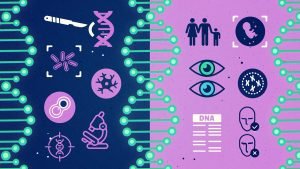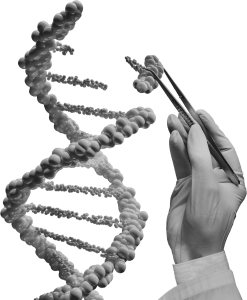How definitions drive debates: The ethics of genetic editing
by Laura M. Browning
When Chinese scientist He Jiankui claimed in 2018 to have used gene editing to make a pair of twin girls HIV-resistant, the scientific world responded with shock — He had used a relatively new technology, called CRISPR, that had not yet been used in human trials. He Jiankui’s claims, which resulted in a prison sentence for violating legal and ethical regulations, hastened inevitable ethical questions about gene editing. In our debate titled “Future of Genetics: Should We Create Superhumans?”, we ask what long-term challenges and opportunities CRISPR presents, looking closely at two particular consequences: the implications of gene editing on global inequality, and the risk to evolution. Here are some definitions to keep in mind during the debate.
The human genome is the complete set of genes of a particular species — a kind of genetic blueprint. In 1990, an international scientific research project called the Human Genome Project set out to identify and map every gene contained in the human genome. Practically speaking, the project identified 1,400 disease genes, an increase of more than tenfold from when the project began. Completed in 2003, the Human Genome Project laid groundwork for future gene editing. Gene or genome editing gives scientists the ability to change an organism’s DNA. The most recent technology to make genome editing possible is one that you may have heard in the news in recent years: CRISPR-Cas9. CRISPR (pronounced “crisper”) is an acronym for “clustered regularly interspaced short palindromic repeats,” and Cas-9 is shorthand for “CRISPR-associated protein 9.” Building on 30 years of research, biochemists Jennifer Doudna and Emmanuelle Charpentier published a paper in 2012 showing that CRISPR-Cas9 could be used to cut DNA at a specific location — a kind of molecular scissors. In other words, gene editing.
CRISPR technology can be used for both somatic editing and germline editing. Somatic gene editing creates changes that are not heritable — that is, the genetic changes cannot be passed down to offspring. Germline editing is the focus of most ethical debates around gene editing, because any changes made in the germ line will be inherited, generation after generation. Opponents point out that future generations can’t consent to their genes being altered, and that we don’t know what effects it could have over the course of many generations. It also raises questions about cultural norms; what is considered attractive or appealing now may not be in another century.
Proponents of heritable gene editing point to liberal eugenics to describe its potential. The term “eugenics” was coined by Francis Galton, an English scientist and polymath, in his 1883 book, “Inquiries into Human Faculty and its Development.” He describes it as the “cultivation of race,” drawing from the Greek “eugenes,” which Galton defines as “good in stock, hereditarily endowed with noble qualities.” Galton’s ideas about eugenics were made famous, to horrific effect, by Adolf Hitler’s obsessive experiments to create a so-called superior race. “Both the theory and practice of eugenics were also carried out in the United States, with forced sterilizations of Native Americans, Puerto Ricans, people in state mental institutions and those with disabilities.
“Some of these mass sterilizations went on until at least 1976.”
“Liberal eugenics” was popularized by philosopher Nicholas Agar in 2004. Agar claimed to be “primarily concerned with the protection and extension of reproductive freedom,” adding “the choice of certain your children’s characteristics” to the list of freedoms around reproduction, such as the freedom to choose when and how often to reproduce. So rather than eugenics being state-controlled, Agar frames it as a freedom of choice made solely by parents, with regard to their own children. With CRISPR technology, the scientific community is on the cusp of making these choices a reality.
Prenatal screening today includes what could reasonably fall under this definition of liberal eugenics. For instance, parents could choose to terminate a pregnancy in which the fetus was found to have a significant disability. We don’t currently have the ability to select traits like eye color or height, but CRISPR puts that technology within sight. Charpentier and 17 other scientists published a plea in “Nature” magazine in 2019, calling for an international moratorium on germline editing while an international governance framework could be agreed upon.
Opponents of liberal eugenics point out that even to the extent it already exists, it is only available to those with the privilege and means to use it. Pregnant people who don’t have high-quality prenatal care, abortion access or money are probably not in a position to make the same choices that a pregnant person of means has. Moreover, disability rights activists point out that the chief problem isn’t the disability itself — it’s society’s refusal or inability to accommodate it. Many people with autism, for instance, don’t think of it as something to be eradicated or “fixed” — it’s simply different from neurotypical people. So using liberal eugenics to increase attractiveness, or eradicate disabilities or congenital conditions, while seemingly a net good, could in fact deepen global inequalities by granting these gene-editing abilities to the people who can afford them. Opponents also argue that this commercializes life itself, effectively creating a market-based eugenics. It also arguably poses a risk to natural evolution, as genes may have several unrelated functions, so removing a gene that increases the risk of Alzheimer’s could result in getting rid of a gene that protects against vitamin D deficiency.
Although the scientific terminology around gene editing can be quite complicated, the ethical questions are easier to understand, if not answer: Should we heed Charpentier’s call for a moratorium on gene editing? Do we have a moral imperative to try to improve the human race? How do we weigh the risks and consequences of interfering with extremely complex systems?
Watch the full debate

Future of Genetics
